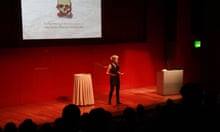Sophie Scott is a senior fellow at University College London. She is an expert in cognitive neuroscience, particularly in relation to communications. This year, she is giving the Royal Institution Christmas lectures looking at how evolution has shaped our bodies to communicate with each other. She also does standup comedy.
When and how were you asked to do the Royal Institution Christmas lectures?
They asked me back in April this year. I was contacted by somebody from the RI on Twitter and they said: “Can you come in to chat to us about a project?” I thought it was going to be for educational purposes or a podcast. It didn’t cross my mind for a second what it was. It was amazing.
Growing up, did you watch the RI lectures?
I watched them intently when I was a child. They changed what I thought about science, because I was used to science at school being a body of knowledge you were told about. Then Carl Sagan did one, looking at the data coming back from the Voyager craft, and I was blown away. There aren’t many things you can point at and say: “This why I ended up doing what I’m doing”, but the Christmas lectures for me really are that.
Your area of expertise is communication, but there remains a suspicion that scientists who communicate with a wider audience trivialise science. Have you encountered this attitude?
It’s what’s known as the Carl Sagan effect, which refers to the fact that he was blackballed by the American scientific community because of his public engagement work. But there was an analysis a couple of years ago that found that that attitude still holds true in neuroscience. So the more public engagement work someone does, the less scientific their science is. It’s not seen like that by the public, but of course they’re not making the decisions about who gets funding. It’s something I really strive to overturn.
Many animals laugh, including, apparently, rats. What have rats got to laugh about?
They laugh for the same reasons as other animals: it’s a social behaviour. We tend to associate laughing with jokes and humour in adult humans, but actually laughter is always something that happens primarily around members of your own species. Particularly the ones you know, particularly the ones you like. Rats laugh when they’re tickled and when they’re playing. That’s true of apes and humans too.
What are the advantages of laughter over a wry smile?
They are twofold. Laughter is a very strong cue to others to join in. So it works as a behaviourally contagious phenomenon. It also feels good to laugh. You get a kick from laughter. It’s having an effect at multiple levels. There’s some very good research from Robert Levenson on positive affect. If both members of a couple laugh or smile, they can deal with stressful situations. But only if they both do it.
We’re 30 times more likely to laugh with someone than on our own. Is laughing alone an activity that should be of concern?
All laughter’s good. Don’t worry about laughing on your own. It’s a statistical phenomenon – you’re much more likely to do it around other people. I realised the other day the same is true of speaking. You’re much more likely to talk around other people.
You have done standup comedy. What made you try that?
Professional jealousy. UCL does a standup event that has become incredibly popular. When I first heard about it, I thought I really don’t want to do that. I don’t want to expose myself. I have worked very hard to get where I am, thank you. I don’t want to throw it away in a pub. Then one of my male colleagues said to me that he’d done it and he was really good, and I thought, you haven’t even asked me, you swine. Next thing, I was in a pub in central London thinking, what have I done? But it was very interesting. Obviously, it was a great kick when people laughed, but my main thought when I came off is that I want to do that again. I think that it’s made me a more confident speaker.
Can you explain your interest in thermostats?
I was on Facebook and I saw a group called Photo of My Thermostat. You can only post photos of your own thermostat, unless it’s a Friday, when you can post pictures of any thermostat. It’s an absolute delight.
You’re fascinated by accents. What’s your favourite accent?
Without question, a Blackburn accent. I grew up in Blackburn, but my parents were from the south. They had markedly different accents to everybody else. And there weren’t many people called Sophie in those days. In Blackburn, people call me Sore-phie. I love it. If I meet someone who calls me Sore-phie I’m almost purring like a cat. It’s like going home.
Why are women’s voices getting lower in the west but higher in Japan?
Entirely cultural factors. In the west, it seems to mirror women coming into the workplace. Voices are very flexible and, although we’re not going to reach a male register, we seem to be reducing the difference. Whereas women in Japan are known to raise the pitch of their voices if they’re around men. Research shows that the more a man likes a woman he’s talking to, the more he’ll raise his pitch to match hers.
What book would you recommend that you’ve read this year?
I read Selfie by Will Storr and it’s absolutely brilliant. It’s a fantastic investigation into the concept of self-esteem and identity. The literature on self-esteem is just based on wish-fulfilment. The literature that’s supposed to support it just doesn’t support it. It’s an amazing book.
Can you tell us a surprising fact about language or communication?
Only human eyes have got whites that are visible all the time. It’s to do with making human eyes stand out so we can tell where each other is looking, because we use eyes a phenomenal amount in communication.
You’ve recorded the lectures already. How did they go?
I got so stressed out I was actually sick. I’ve never known stress like it and I did physics A-level. But there’s an incredible team here. And it was amazing.
The Royal Institution Christmas lectures with Sophie Scott will be broadcast at 8pm on 26, 27 and 28 December on BBC Four










Comments (…)
Sign in or create your Guardian account to join the discussion